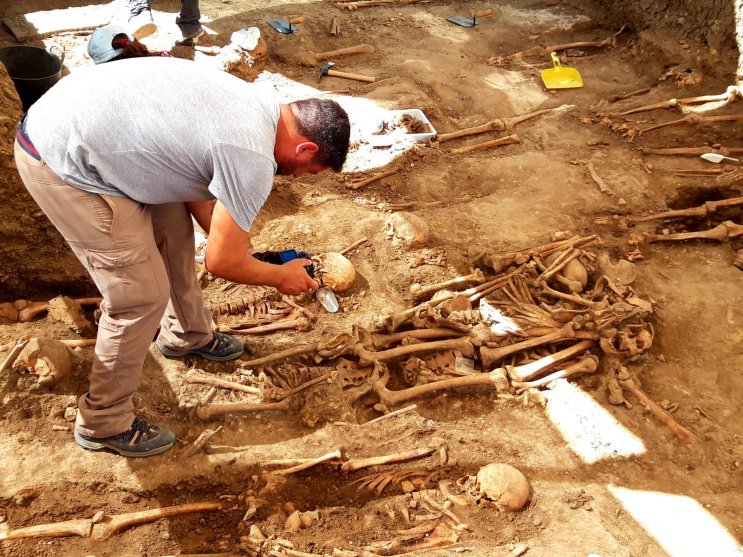Reflections From My Desk, by Debbie Eade
We have a visitors’ book at the Casa de la Memoria La Sauceda. Very occasionally, someone will leave a comment such as ‘why don’t you tell the whole story of the Civil War? Both sides killed people’. And I’m sorry that they haven’t understood what the Casa de la Memoria is about, and that they didn’t engage with us about their concerns and feelings, because it leaves their question unanswered. They may still not agree with us afterwards, but at least we would have had an opportunity to exchange our views calmly, and perhaps add to their understanding of what we do here.
Both sides did kill in the Spanish Civil War, of course; every single death, every single atrocity, is a tragedy and we mourn them equally. We are not trying to put more value on some people’s lives than others, because of their political ideas. That’s what Franco did. But an important part of what we do at the Casa de la Memoria is explain what happened in this area, the Campo de Gibraltar, because it is one of the places in which the Civil War began.
Franco brought troops of mercenaries across from Morocco in July 1936 and instantly began murdering innocent people, purely because of their beliefs about society and the way they had voted. He and those backing him didn’t just want a coup d’état, to overthrow the democratically elected government. They wanted to rid the country of ‘reds’ forever. He is quoted as saying that if that meant exterminating half the population, that is what he would do.
The Franco regime carried out eugenic testing to try to find a supposed ‘red gene’. They took away the babies of Republican women, in a scandal that continued until the 1980s and still has repercussions now. They forced women to scrub the blood of their husbands, fathers, brothers, from the streets where they had been shot and left for two days as an ‘example’ to others. They took women from their homes, shaved their heads, purged them with castor oil, and marched them through the streets, fouling themselves from the purgative, with the guards banging on people’s front doors to force them to come out and witness their neighbours’ and friends’ humiliation, before they were taken away and shot. There were torture and executions, long after the Francoists had won the war they started.
If people forget the past then history is likely to repeat itself, and fascism didn’t die with Franco. It is still alive today and longing to start kicking.
The victors of any war write the history books and Franco was no exception. He also ruled Spain ruthlessly as a dictator for nearly 40 years. That means there is a huge gap in people’s knowledge. At the Casa de la Memoria we provide the facts: we show what happened. And what happened was truly shocking.
I wonder if the people who leave comments of that type in our visitors’ book would walk into a Holocaust Memorial Museum and say “you should tell the whole story; the Nazis weren’t the only ones who killed”. Somehow, I think not.
There is still a huge gaping wound in Spanish society today, and it is far too deep to heal itself.
When Franco died, those who took charge decided to move on, to sweep what had happened under the carpet and forget about it. But there is far too much to be hidden under any size of carpet. Too much pain that has never eased.
Too many loved ones killed, tortured and disappeared during 40 years of repression. Too many victims whose whereabouts are still unknown: at least 112,000 are estimated to be lying in unmarked graves somewhere, possibly many more.
I wish people could see how many tissues we have handed out to visitors to the Casa de la Memoria to dry their tears, since we opened four years ago. How many hugs we have shared with strangers, before the pandemic placed physical but not emotional distance between us. How many experiences have been relived and heard, because this is a place where people feel safe to talk and it helps to ease a burden whose weight never lessens, no matter how many years may pass.
I wish they could talk to the people anxiously awaiting the results of DNA tests on the bodies we helped to exhume from the pits at Jimena cemetery into which they had been thrown, desperate to know if their relatives are among them. That scenario is being repeated in different cemeteries across the country, thanks to the efforts of groups like ours.
The new Democratic Memory Law which the Spanish government aims to introduce will help the historical memory movement in its attempts to assist people in finding out what happened to their loved ones. It will acknowledge Franco’s crimes and officially recognise his victims. It will mean more mass graves will be found and exhumed, and their families will be able to give their relatives a dignified resting place at last. Public exaltation of Franco will be prohibited, as it is of Hitler in Germany. It will bring Spain more in line with UN recommendations and international norms. It is long overdue.
Our Casa de la Memoria and other centres like it are not, as some may believe, perpetuating divisions. Quite the contrary. We are giving a voice to people who have never had one, telling a story that was deliberately kept quiet, and helping to move forward to a situation where people can finally gain closure, peace and justice.
That is the way towards reconciliation and acceptance, towards healing the breach which may not be obvious to outsiders but is like a yawning chasm for those who live with it. Truth, Justice and Reparation for victims of Franco and their families. That is our mission, and we are proud to be part of it.

